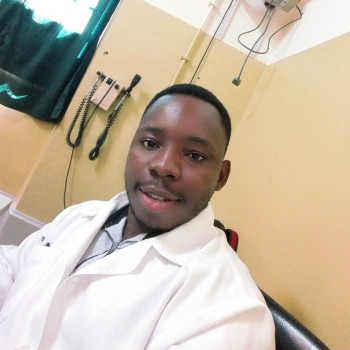Pereira is the ocular health responsible for the province of Inhambane. He is a trained optometrist and his call was to make accessible to his countrymen quality ocular attention services.
Pereira has just been recognized by the IAB as Eye Health Hero, in the category of Future Leaders. An international prize that recognizes professionals that are on the frontline due to his community engagement, achieving significative changes in the improvement of the population’s ocular health.
From the Inhambane’s Provincial Hospital and with a lot of determination, Pereira leads a small team that works full speed to offer to the province’s population, as well as persons living in rural and remote villages, the ophthalmologic and optic eye care that they require. And the Eyes of the world Foundation is right beside him to make sure it happens.
Which activities are you carrying out from the Ocular Health Service of the Inhambane’s Health Direction to fight preventable blindness?
We have a cataract operation programme that allows people of remote and in need communities to recover their vision. Persons who live far from a hospital and health services. In addition to this, we have a programme for schools that allows the detection of ocular illnesses and refraction errors of pupils to whom, afterwards, Eyes of the world facilitates eyewear with the adequate prescription. We are also working with albino persons, so they have access to ocular reviews and to prescription eyewear for those who need so.
What is what takes most of your day to day and what does this job bring you?
One of the things that I love most of devoting myself to ocular health is to achieve that children are able to see properly and move on with their lives. Or that the parents which were blind are going back to work. Those things make me believe that it is possible to fight preventable blindness in my country and abroad. Cataracts may be treated via surgery and the refraction errors corrected with eyewear. This is the most motivating part of my daily work.
Do you remember any story of any patient that has especially marked you? Can you share with us some remarkable example?
I remember when I arrived at Inhambane, a lot of people did not know what it was to be an optometrist. There was a lot of doubt. The first day in my consultation there were two patients, a 16 year-old-girl that had headache and was not able to study, vomited… The results of other medical consultations were normal and her GP referred her to the Ophthalmology Department. I conducted all the necessary tests and it turned out she had medium astigmatism. When she started wearing prescrition eyewear, she stopped having headaches and until date she has been perfectly fine.
Another 15-year-old boy had been checking his vision withouth obtaining a diagnosis because the technicians that were in the hospital did not have the sufficient knowledge. When I reviewed his vision, he had a bilateral keratoconus. I explained the situation to the family and we had to send him to Maputo, where he could be operated and his cornea was transplanted. At the present time, he is able to see.
What does the collaboration with the Eyes of the world Foundation consist on?
Inhambane’s Hospital works in coordination with Eyes of the world since 2015 on fundamental activities for the community development and the improvement of the quality of life of its population, restoring vision to patients suffering from cataracts and other treatable pathologies. We also work together on awareness campaigns to generate behavioural changes in people’s lives.
What do you think about the Eyes of Inhambane project? How is ocular health improving there?
The contribution of Eyes of the world has meant a big difference, not only for the ocular health professionals, but as well to give back the ability to see to a lot of people who do not have access to primary health care, for instance, those that are based in rural communities in the province, many kilometers away.
Eyes of the world, in collaboration with the Inhambane’s Health’s Provincial Department, achieves to provide ophthalmologic coverage and provides assistance at a physical and emotional level. For those patients, to be able to rely on Eyes of the world means hope.
What does it mean to you to receive a prize like the IAPB’s Eye Health Hero?
The prize is an important milestone for me at a professional level and a catapult towards new horizons, especially now that my daughter has just been born. This prize will bring recognition and empowerment to the activities that are being done here, in Inhambane, that will for sure go better. Having been elected has been marvelous and also sharing it with family and friends. In addition to this, it will encourage other professionals that want to follow my path.
